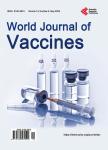Prevaccination Antibody Confers Additional Immune Responses to Repeated Yearly Influenza Vaccination in an Elderly Population
Prevaccination Antibody Confers Additional Immune Responses to Repeated Yearly Influenza Vaccination in an Elderly Population作者机构:Department of General Medicine Kochi Medical School Hospital Nankoku Japan Kochi General Rehabilitation Hospital Kochi Japan
出 版 物:《World Journal of Vaccines》 (疫苗(英文))
年 卷 期:2022年第12卷第2期
页 面:11-19页
学科分类:1004[医学-公共卫生与预防医学(可授医学、理学学位)] 100401[医学-流行病与卫生统计学] 10[医学]
主 题:Influenza Vaccine Elderly Persons Repeated Vaccination Seroprotection Rate
摘 要:Annual vaccination is necessary to maintain humoral immunity in the elderly population. However, the factors influencing the response to influenza vaccination have not been completely identified. The aim of this study was to explore the factors that influenced antibody responses to repeated vaccination using measures that were both objective and quantitative. A total of 111 volunteers aged 61 years were vaccinated subcutaneously with one dose of influenza vaccine from the 2005-2006 season through the 2009-2010 season. The factors that influenced antibody responses after vaccination were evaluated. The seroprotection rates (PRs) were significantly higher in responders (subjects with a higher antibody titer in the 2005-2006 season) than in nonresponders only in the 2006-2007 and 2007-2008 seasons. PRs after vaccination were significantly higher in seropositive individuals (subjects with a higher prevaccination antibody titer in the 2006-2007 season) than in seronegative individuals for all three virus strains in almost all of the 5 years. Age, gender, and vaccination in the 2004-2005 season did not influence the response. These results suggest that an immune response at a certain time point would predict immune responses only in the near future. However, prevaccination antibody titer in the following season is the ideal predictor for future responses that last over several influenza seasons.



